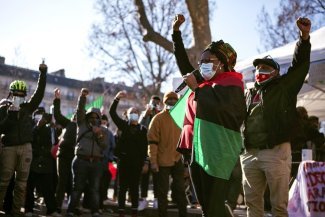The ‘piqueteras’ movement in Argentina, the street protests that arose during the 2001 crisis, took domestic chores from the privacy of the home to the community level, organising neighbourhood kitchens that would guarantee food for the people of the local district. This type of initiative continues in the neighbourhoods of Buenos Aires today, as well as in the suburbs of the large Latin American cities. In this March 2020 picture, Alejandra Gómez prepares a lentil stew for the impoverished inhabitants of a district in the Argentine capital.
In the early morning hours of 29-30 December, the Argentine Senate voted ‘yes’, as expected, to the Law on the Voluntary Interruption of Pregnancy. As in 2018, when the law failed to get through, thousands of women gathered in the streets and spent the whole night waiting for the result of the historic vote. Many burst into tears upon learning the result: the shared feeling that it was social pressure that overcame resistance and won the biggest demand in recent decades of the feminist movement in this southern country and in much of the world: the decriminalisation of abortion.
To tell the truth, the power of feminism in Argentina was already very visible, and had been since at least 2015, when the Ni Una Menos (Not One Woman Less) movement emerged with force. It began by putting the question of femicide on the agenda, but from there it expanded into other areas of male chauvinist violence, and linked up with other struggles around not only gender but also racism, and territorial and class conflicts. And while Argentina is perhaps the most prominent case, diverse forms of feminism –rural, peripheral, Black, trans – spread throughout Latin America, as well as other territories of the Global South.
“The feminism of which I feel part took to the streets and, from this, began to explore all spaces: from the street to work, home, sexual-emotional relationships,” says the Argentine academic and activist Verónica Gago, author of Feminist Power. Or the Desire to Change Everything. “Starting from our experience of the street, of strikes, marches and assemblies, it is not only a question of identities, but of organising conflict and creating political alliances with a great diversity of collectives; this is how the agenda is expanding,” continues Gago.
This feminism that begins in the streets, articulates conflicts and is bound up with other struggles is flourishing throughout the Americas. Black feminist groups were the first to speak of intersectionality, a term coined by the African-American lawyer Kimberlé Crenshaw in the United States to understand how the various forms of gender, ethnicity and class oppression intersect, in a line of thought enriched by authors such as Angela Davis and, in Latin America, the thinkers of decolonial feminism, as well as rural, Indigenous, community and favela-based feminist groups.
These different community-based feminist movements have brought to the discussion the notion of the existence of plural worlds, in response to the modern, typically Western vision of a universal subject that uses neutral language, but is actually white, male and Eurocentric.
“What we are saying is that this society, which claims to be neutral, is masculine in its neutrality, insofar as it is not caring, it does not reproduce, it buys everything and sells everything: it commercialises everything. It is the capitalist ideal,” summarises the Mexican thinker Raquel Gutiérrez.
“The response to this is the logic of interdependence, which is about how life works. We must learn to look at things in another way: to think about where we drink water, where we eat, who grew the cotton to make the clothes we wear, who wove them. When you think in terms of interdependence, you begin to understand the global question, and you begin to take care of the flows of life, which are the flows of the planet as a whole,” she adds.
“When we talk about universality, we are talking about something that has the power to encompass all diversities and express all differences. The feminism I come from, which is the background to my life and my history, is shaped by my condition as an Afro-Indigenous, peripheral woman from the favelas,” says Brazilian Helena Silvestre, who contributes to fora such as the Amazonas Magazine and the Abya Yala Feminist School and has been active since the age of 13 in movements for decent housing in São Paulo. In this context, land occupations are upheld as spaces that make it possible to make visible which tasks are essential and who performs them: “The precariousness of the shacks in our shanty towns means that tasks such as washing clothes and cooking are done in community spaces.”
It is a similar story in many other territories that deal with precariousness on a daily basis. Thus, the ‘piqueteras’ movement in Argentina, the street protests that took place during the 2001 crisis, took domestic tasks out of the privacy of the home to organise community cooking in order to guarantee food for the people of the neighbourhood; these types of initiatives endure in the districts of Buenos Aires, as well as in the suburbs of other large Latin American cities.
Guardians of the earth and of memory
It is also women who have taken on the responsibility of sustaining life in the rural territories of the impoverished countries of the Global South that are under threat from the advance of extractive activities such as open-pit mining, oil extraction and agribusiness. Rural women from the Union of Land Workers (Unión de Trabajadoras de la Tierra, UTT) in Argentina have linked the agribusiness model, which devastates territories with its use of highly polluting agrochemicals for the land and for health, to the patriarchal order, while agroecological production is seen as feminist. In many Indigenous communities, it is women who are at the forefront of the resistance against extractive activities, be it agribusiness, open-pit mining, large dams or oil exploitation.
They identify themselves as ‘guardians’ of the land, water and seeds, as well as the collective memory of their communities, by guaranteeing the transfer between generations of ancestral knowledge about, among other things, sustainable ways of producing food.
Their role has been documented by thinkers and writers such as Vandana Shiva, Maria Mies, Silvia Federici and Francesca Gargallo.
These women often risk their lives. This was evidenced by the murder of the Honduran woman with Indigenous roots, Berta Cáceres, who paid with her life for daring to oppose the construction of the Agua Zarca dam. She understood the connections between sexual violence, the extractivist model and the feminist claim to desire, when she said: “If women do not talk about their bodies with each other, if they do not recognise their right to pleasure and not to suffer violence, they will not be able to understand that militarisation is a practice of territorial invasion that is linked to violence against women, by using rape as a weapon of war.”
Politics in a feminine key
“Women have always been involved in conflict, playing an anonymous but vital role. From the patriarchal perspective of what struggle means, however, and what politics is, their activism is unseen, as is their reproductive and caring role. This view forgets that political practice arises from everyday life,” points out Silvestre. Indeed, it is often forgotten that the management of daily life, in which the domestic work that guarantees the reproduction of life has a central place, is part of politics. But the patriarchal order imposed a dichotomy between the public and the private, and entrenched the domestic tasks historically assigned to women to the private sphere, making them, supposedly, non-political.
Indeed, one of the greatest challenges being raised by popular feminist movements in the Global South is this profound questioning of what politics means.
The Argentine anthropologist Rita Laura Segato speaks of ‘feminist politicalness’, or politics in a feminine key. It is no longer just about the content of political discourse, but about asking ourselves what it means to do politics. And this is to understand that women are undertaking fundamentally political acts when they organise women in their communities to provide water to the community, organise communal cooking in the neighbourhood or, in times of a pandemic, guarantee – through the distribution of food baskets and other basic goods – the survival of those families that live from day to day, that cannot work or aspire to any state subsidy. In Segato’s words: “It is not that the personal is political; it’s that the political is domestic.”










